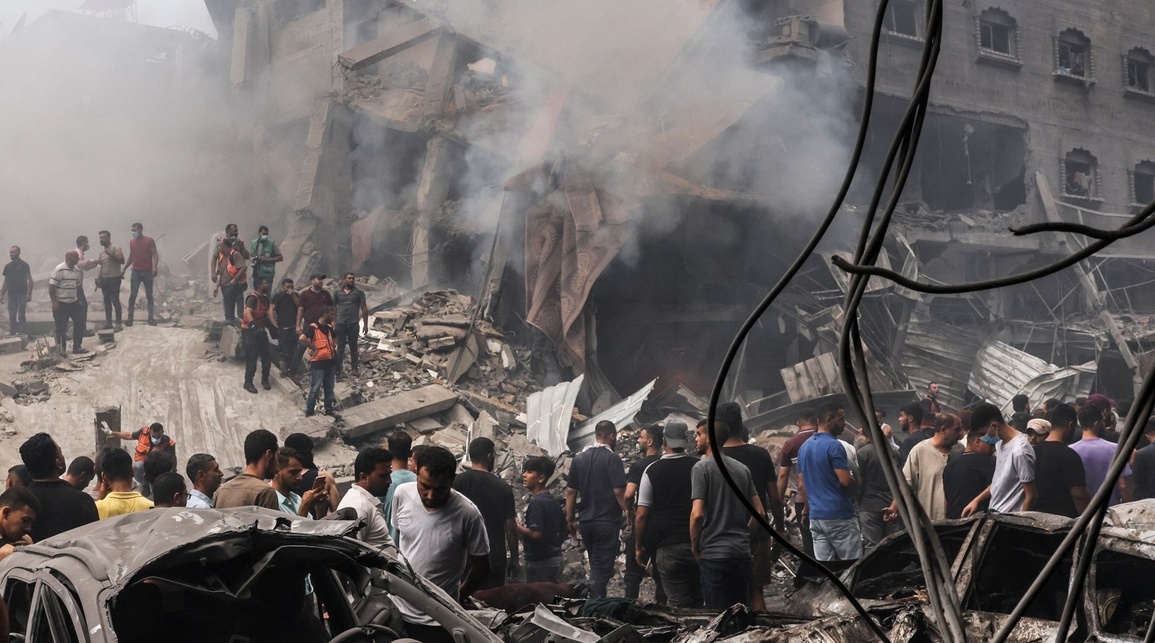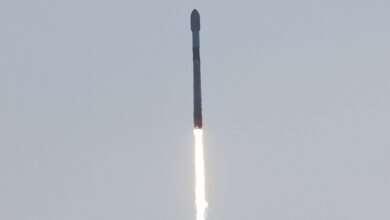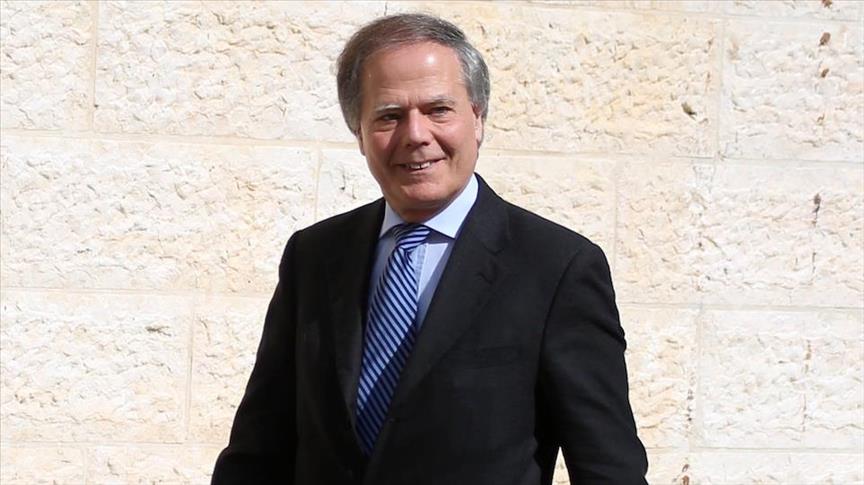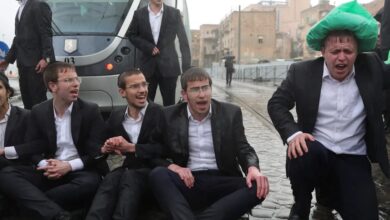Persian world: The Al-Aqsa Flood from the Tehran front
Nasser Kenani "The Al-Aqsa Flood is a natural reaction to the warmongering, provocative and provocative policies of Netanyahu, the radical and adventurous prime minister of the usurper Zionist regime."

The violence that broke out in April at the Al-Aqsa Mosque in Jerusalem, a holy place for Muslims, escalated the tension in the region, and during the clashes that lasted for days, Israeli police raided the mosque and arrested dozens of worshipers.
The violations of the Israeli police under the blockade reactivated Hamas, which controls the Gaza strip. Commander of Hamas’s armed wing, Izz al-Din al-Qassam Brigades, Mohammed al-Dayf, announced that they launched a comprehensive operation called “Aqsa Flood” against Israel from the blockaded Gaza Strip on Saturday, October 7. Stating that the Palestinian people took action again with the motives of “revolution and state-establishment”, Dayf argued that this operation was implemented due to Israel’s violations.
The military wing of the Palestinian Islamic Jihad Organization, the Quds Brigades (Saraya al-Quds) and the Popular Front for the Liberation of Palestine (PFLP) also participated in the operation. Lebanese Hezbollah also claimed responsibility for the attacks on military headquarters on the Israeli border. In addition, the Asaib-i Ehli Hak group, affiliated with the Iran-backed Hashd al-Shaabi, operating in Iraq, stated that they were ready to support and assist.
As part of the operation, simultaneous attacks were carried out on more than 50 military points in southern Israel. Israeli defense lines were breached and settlements were infiltrated. In his public address early on Saturday, Israeli Prime Minister Benjamin Netanyahu described the clashes as a “war” and announced that a “special security situation” had been declared. Many points in Gaza were targeted by Israeli air strikes. Some of these were civilian settlements and public institutions. In his address to the nation on Saturday night, Netanyahu warned Israeli settlers in the Gaza Strip to “leave the area, we will turn every place where Hamas is located into rubble.”
TEHRAN: A NATURAL REACTION TO NETANYAHU’S PROMOTIONAL POLICIES
Perhaps what was most curious was Tehran’s reaction after the operation. Iranian Foreign Ministry Spokesperson Nasser Kenani interpreted the Al-Aqsa Flood as a natural reaction to the warmongering, provocative and provocative policies of Netanyahu, the radical and adventurous prime minister of the usurper Zionist regime.
In a telephone conversation with Turkish Foreign Minister Hakan Fidan on Saturday night, Iranian Foreign Minister Hussein Emir Abdullahiyan said that “the resistance movement is a result of the crimes committed by the Zionists incessantly.” He underlined that Muslim countries should be in solidarity and cooperation in supporting Jerusalem and the oppressed Palestinian people.
The reaction from the parliament was also immediate. At the beginning of the second public session of the Islamic Council of Iran on Saturday, MPs gathered in front of the speaker’s rostrum and chanted slogans such as “Palestine is victorious, Israel will be destroyed” and “Down with Israel”, “Down with America” and “Down with England”.
Muhammed Bakır Zülkadir, Secretary General of the Council for the Identification of the Benefits of the Order, said, “October 7, 2023 will go down in the history of Palestine struggle. An operation of this magnitude has not occurred in the last 75 years. Until this morning, 420 Zionists were killed in an area of 90 square kilometers, 20 kilometers deep into Israeli territory. While the Zionists claimed to have intelligence superiority in Gaza, they had to leave the region in confusion. Another important point was the attack of the resistance forces. Zionists began to defend their own lands for the first time. “The latest events show that this is the beginning of the collapse of the Zionist regime,” he said.
CHIEF: INSHALLAH WE WILL PRAY TOGETHER IN THE MOSQUE OF AQSA SOON
President of the Islamic Republic of Iran, Ayatollah Ibrahim Reisi, spoke on the phone with Hamas political leader Ismail Haniye and Secretary General of the Palestinian Islamic Jihad Movement, Ziyad al-Nahale, on Sunday, October 8. During the meeting, he said, “The victorious operation carried out by the Palestinians in the occupied territories is an indication that the 70-year longing of the Palestinian people and the Islamic Ummah has been realized. “Hopefully, we will pray together in Masjid al-Aqsa soon…” he expressed his wish.
Iranian Chief of General Staff Mohammed Hossein Baqeri stated that Palestinian organizations can organize complex and intricate operations that challenge Israel’s capabilities, including the Iron Dome, and that some desperate initiatives such as the “normalization charade” cannot slow down the pace of Israel’s collapse. Bakıri said, “Operation Al-Aqsa Flood is the product of the anger that the Zionist enemy has sown in the hearts of the oppressed Palestinian people and must now reap.” said.
Revolutionary Guide Ayatollah Ali Khamenei also shared about Hamas’s Aqsa Flood operation against Israel on the social media platform
Iran’s support for Palestine was not limited to high-level officials of the state. Dozens of Iranians gathered in the capital Tehran on Saturday. Activists waving Palestinian flags and carrying Al-Aqsa Mosque banners chanted slogans in support of Hamas. The Palestinian flag was projected onto the iconic Azadi Tower in the capital Tehran and adorned with the name of the operation. There were also calls for support from many non-governmental organizations.
In fact, poet Alireza, Head of the Poetry, Music and Anthem Bureau of the Iranian Radio and TV Corporation, even wrote a poem for the Gazve Al-Aqsa Flood Operation:
“The flood of Masjid al-Aqsa,
Izzedin is the flood of Qassam,
Freedom is a flood,
Islam is a flood,
“It is Soleimani’s anger.”
KADUMI: RESISTANCE FORCES DETERMINE THE FIELD
While newspapers in Iran generally carried the headlines that Israeli officials were shocked by the attacks, Ruzname-i Quds (Jerusalem Newspaper) included an interview with Hamas’ representative in Iran, Khalid al-Kadumi, in its news titled “A Surprise Flood”. Kadumi discussed the operation in three dimensions: 1) Conceptual framework: “Today’s resistance covers not only Gaza but all of Palestine and defends the rights of the Palestinian people.” 2) Advanced technology operation advantage: “Alhamdulillah, we have made serious progress in the resistance land, sea and cyber areas in recent years.” 3) International relations and the support network established by Hamas.
According to Kadumi, these three dimensions were among the greatest achievements of the “resistance”. According to him, “This operation was a clear message from the oppressed Palestinian people to the world and regional regimes demanding normalization with Zionism.” In his speech, Kadumi also commemorated Qassem Soleimani, who was assassinated on January 3, 2020, and stated that “the complete destruction of the Zionist regime” was one of Soleimani’s wishes: “Before his martyrdom, Soleimani supported large-scale operations against the Zionist regime in the occupied territories.”
Kadumi also said the following about the future of the war: “Today, the equations of war have changed and the field against the Zionist regime is determined by the resistance forces, the fight must continue. To avoid failure, European countries and the allies of this regime must not be allowed to attempt to seek peace and exercise human rights. “This struggle stems from the desire of Muslim peoples to save Jerusalem.”
According to the American news portal Politico, the operation coincided with an extremely sensitive diplomatic period when Saudi Arabia hinted that it might normalize relations with Israel, an alliance that would deeply disturb Tehran. In an interview with Fox News last month, Saudi Crown Prince Mohammed bin Salman touched on the possibility of diplomacy with Israel and said, “We are getting closer every day.” Now Riyadh may see this move by Iran as “a move that will fuel regional conflict” against the possibility of defense cooperation negotiations with the USA and normalization of relations with Israel.
ISRAEL: WE SUSPECT IRAN’S FINGER IN THE ATTACKS
Speaking to CBS News, Israel’s Ambassador to the USA, Michael Herzog, said, “We suspect Iran’s involvement in the attacks.” When asked whether Israel would take the war to Iran, Herzog said, “We will respond to whoever attacks Israel.” He just said: What pushed Herzog to utter these sentences may have been the daring statements of former Revolutionary Guards Army Commander Seyyed Yahya Rahim Safavi, one of the senior military advisors of Iranian Revolutionary Guide Ayatollah Ali Khamenei. At the 6th International Conference of Solidarity with Palestinian Children and Youth held in Tehran on Saturday, Safavi said that the Tehran administration supports Hamas’ attacks against Israel: “We support the Al-Aqsa Flood Operation and I am sure that the Resistance Front also supports this cause.” We are sure. Of course, the guards of the holy shrine and great martyrs such as Qasem Soleimani are also on the side of these mujahideen. We will continue to stand by the Palestinian mujahideen until Palestine and Jerusalem are liberated. While Palestinian youth were being killed by the Zionists, international organizations remained silent. “We did not see any reaction from international organizations against these murders.”
These statements of Safavid strengthened the doubts about whether Iran directly supported the operation of its traditional ally Hamas.
‘EVERYONE IS AFRAID OF IRAN’S ATTEMPT TO BEsiege or even strangulate Israel’
Jonathan Schanze, Vice President of the Foundation for the Defense of Democracies, a Washington-based think tank, touched upon an important point in the Hamas-Iran equation with his questions:
“Will tensions rise in the West Bank? Will Shiite militias mobilize in Syria? Will Hezbollah step in? Is this operation merely an attempt by Hamas to reassert itself, or is it part of a broader strategy in which other elements affiliated with Iran also participate? We will see this in the next few hours or days. “I think this is a war in which everyone fears Iran’s attempt to encircle and perhaps even strangle the state of Israel.”
Let’s take a look at BBC Persian’s “Hamas: Attacks were carried out with the support of Iran” news from where Schanze left off. This news was reported in BBC Persian’s “Newshour” program, when Hamas Spokesperson Gazi Hamed asked “How much support did you receive from Iran in this operation?” “I am proud that many countries help us. Iran is helping us. Other countries are also helping us. He supports it with money, weapons or politically.” It went into circulation after he replied.
In response to the presenter’s question, Hamed admitted that, in general, he received different forms of support from Iran and other countries – which he did not explicitly state. However, he did not give any indication that a direct connection was established with Iran regarding this operation. Therefore, BBC Persian’s provocative title is far from the truth. However, it is necessary to take into consideration that the organization has been cooperating with Iran in tactical and operational terms for a long time and to make a comment at this point.
Another analysis supporting these claims came from the Wall Street Journal (WSJ). In its news dated October 9, WSJ wrote that Iranian officials helped Hamas in planning the attacks and that they approved the operation at a meeting in Beirut on October 2. He claimed that representatives of Hamas, Hezbollah, the Palestinian Islamic Jihad Organization and the Iranian Revolutionary Guard Quds Force have been meeting in Lebanon every two weeks since August to discuss the operation in question, and that Iranian Foreign Minister Hussein Emir Abdullahyan also attended at least two of these meetings. .
On the other hand, Amwaj Media, in its news based on local sources, quoted Israel Defense Forces (IDF) spokesman Brigadier General Danny Hagari as saying, “We have not found any evidence of Iran’s involvement in the war in Gaza.” He added that a senior Arab official in Beirut, speaking on condition of anonymity, strongly denied reports that the attacks followed a series of secret meetings between Arab and Iranian officials in Lebanon. Likewise, Iran stated that the United Nations Special Representative shared that Tehran was not involved in the decision-making processes regarding the attacks. The representative said, “We unequivocally support Palestine, but we are not involved in the Palestinian reaction, as this reaction is shown only by Palestine itself. “They [Israel] are trying to justify their failure and attribute it to Iran’s intelligence power and operational planning.” He made statements as follows.
Undoubtedly, many high-ranking officials in Iran, including the Revolutionary Guide, have repeatedly said that Hamas and groups in Palestine are supported. However, in this particular operation, there is no evidence that Iran directly supported the attacks as claimed. While the Tehran administration did not accept the allegations, it did not hesitate to intimidate Israel. Iranian Foreign Ministry Spokesperson Nasser Kenani, in a statement on October 9, denied reports of Tehran’s involvement in the attacks that killed 700 Israelis and injured dozens more, and said that whoever threatens Iran will “devastatingly” take any foolish action against them. He stated that they would respond.
Gizem Aslantepe – Gazete Duvar



